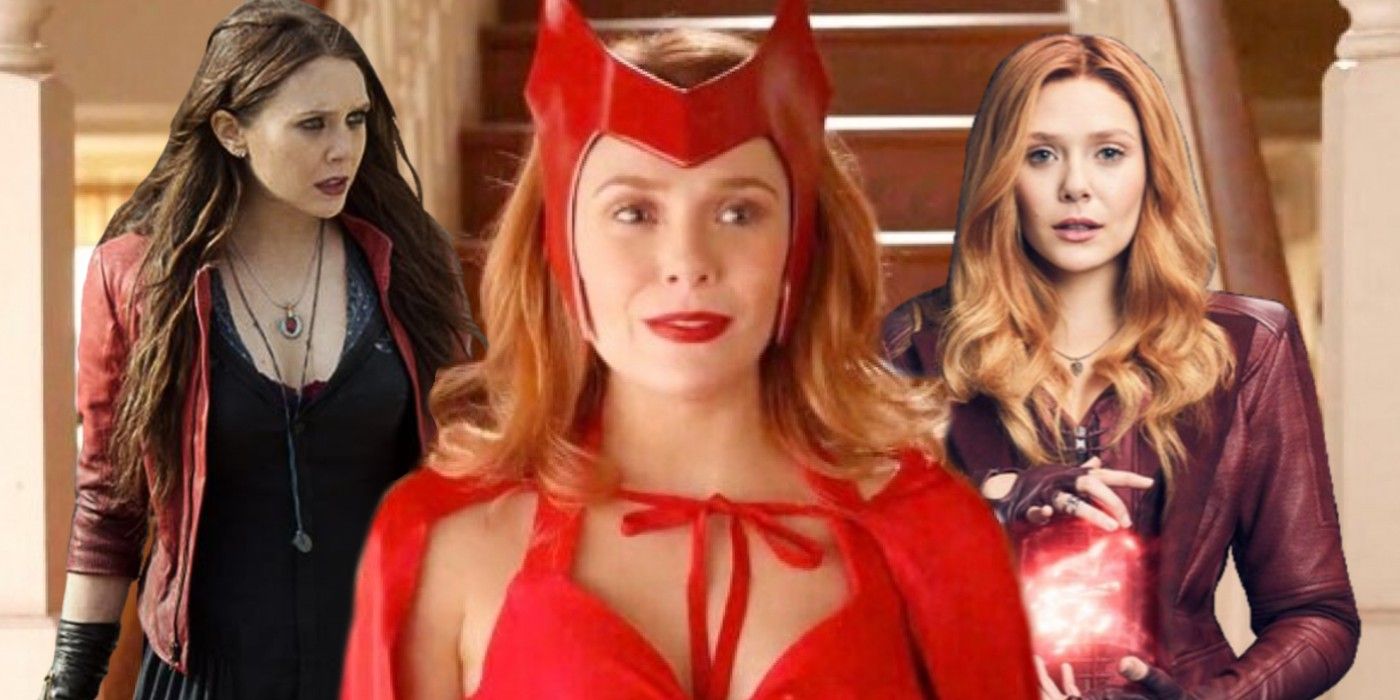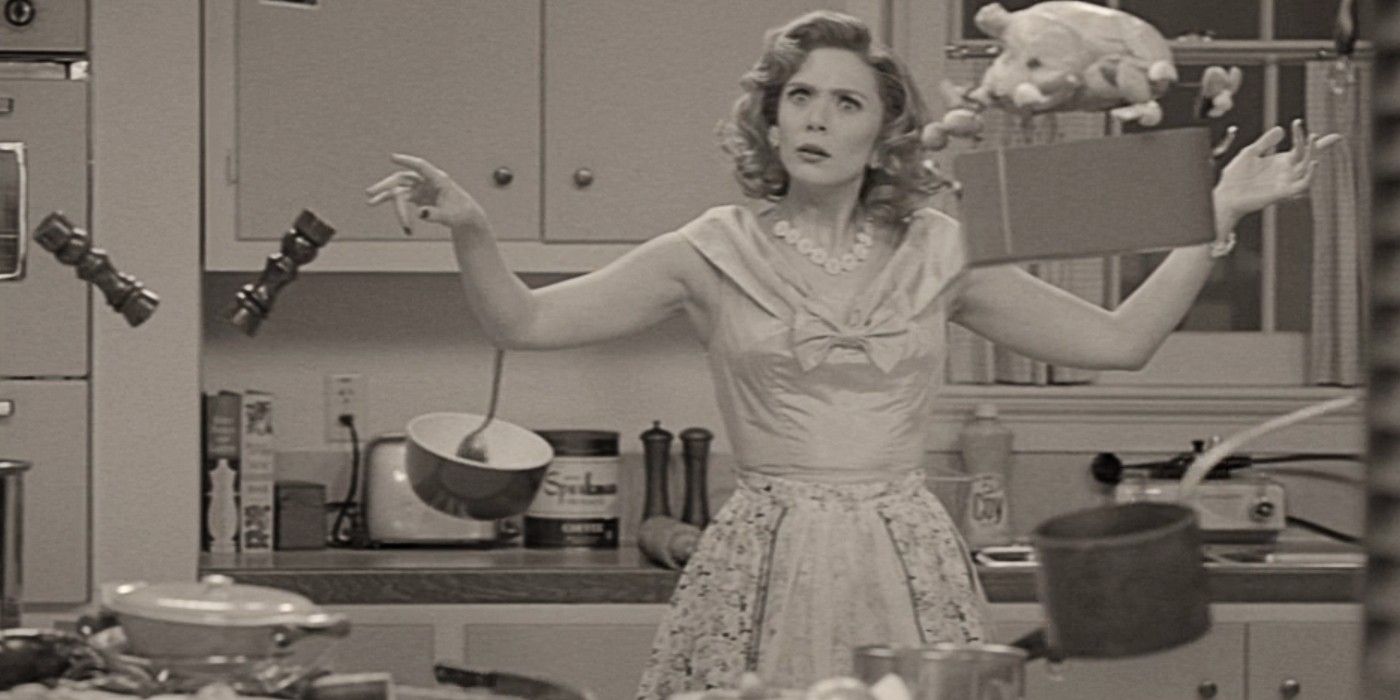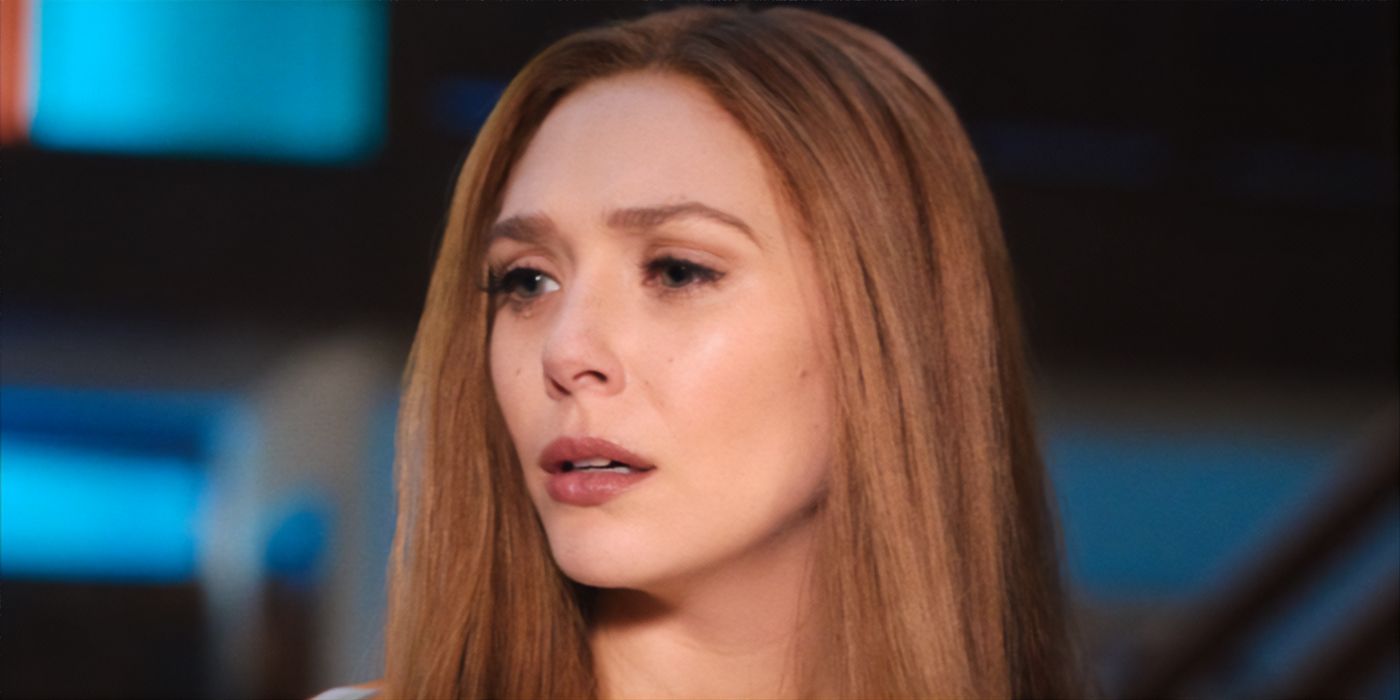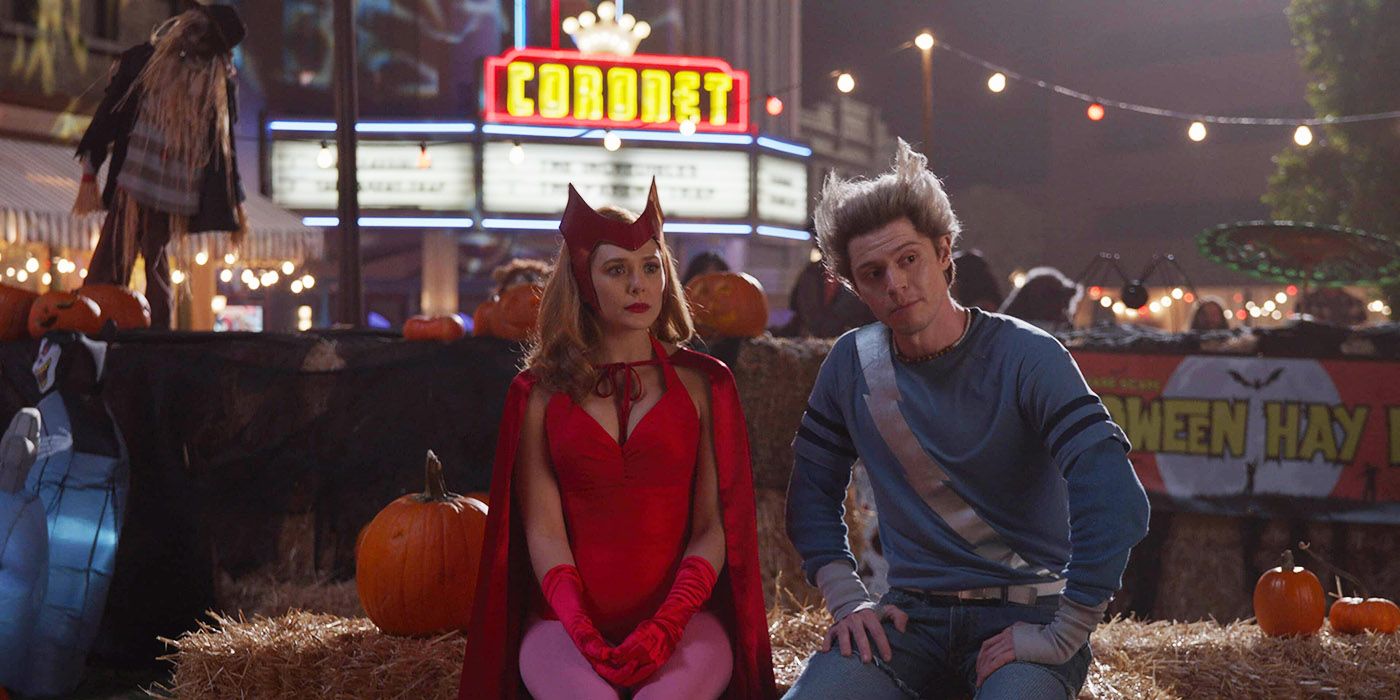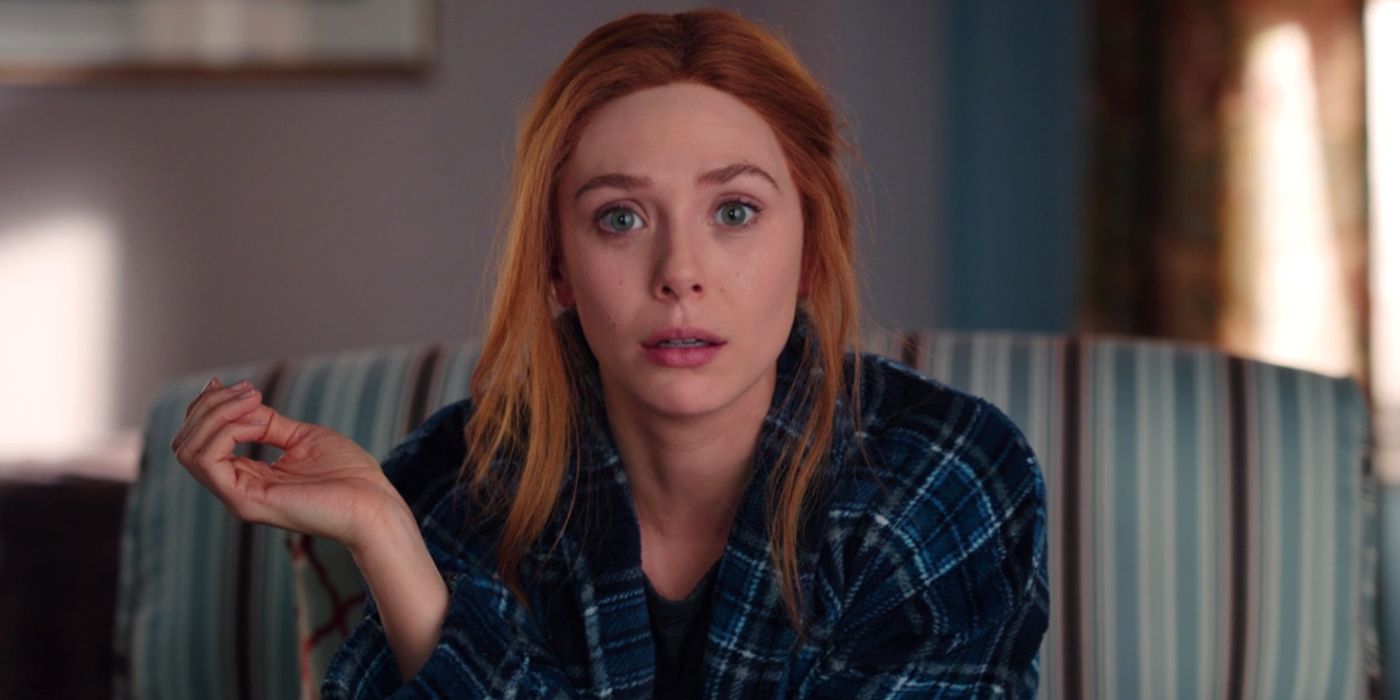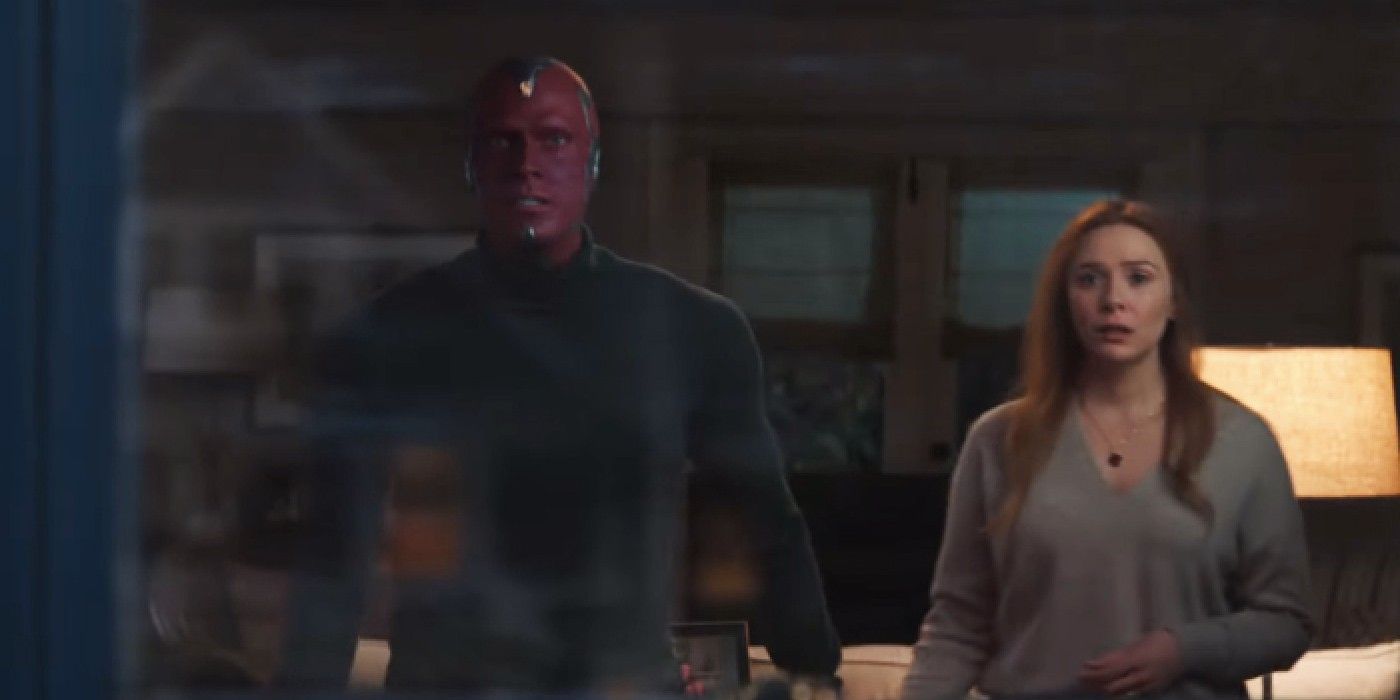As WandaVision nears the ending of its first season, it may very well be that the show has been tracking Wanda's journey through the five stages of grief all along. From the start, it was clear that Wanda (Elizabeth Olsen) created her sitcom reality in order to escape her grief over Vision's (Paul Bettany) death. But as one Redditor points out, the Marvel show may have been about something entirely different.
WandaVision picks up just a few weeks after the events of Avengers: Endgame. Although she was snapped away by Thanos for five years, that means that Wanda hasn't had much time to process Vision's death. Losing Vision meant that she lost the last person she loved in her life. That's enough to send anyone spiraling into a black hole of grief.
The Reddit theory argues that every few episodes of WandaVision represent Wanda dealing with a different stage of her grief. That means that the WandaVision season 1 finale may actually see Wanda finally coming to terms with losing Vision. Here's a breakdown of how each episode of WandaVision chronicles Wanda's insurmountable grief.
How WandaVision Shows Denial
Wanda is fully immersed in her sitcom delusion in WandaVision episodes 1 and 2. She plays the perfect sitcom wife to Vision and she could not be happier. For the most part, everything goes according to plan and Wanda is in full control. The first two episodes of the Marvel series show the couple playing along with traditional sitcom tropes. The illusion breaks just a couple of times, but Wanda omits those mistakes from her "show" by implementing a crude jump-cut or rewinding time in order to try the moment again. From the audience's perspective, it's the most consistent showing of the sitcom motif that WandaVision offers.
That's because Wanda is fully denying Vision's death at this stage in the show. At the time of writing this article, it hasn't been confirmed if Wanda was the one to initially build Westview. But it's clear she's the one who fleshed out the false reality and brought it to life. She did this in order to distract herself from facing her feelings. Wanda is nowhere near ready to face the loss of Vision, so retreating to the sitcom world that she created in order to deny the reality of her sad situation.
How WandaVision Shows Anger
As WandaVision episodes progress, the real world increasingly finds its way into Wanda's bubble — this is mainly due to S.W.O.R.D.'s intervention. When reality creeps into Westview, Wanda is snapped out of her sitcom delusion. That makes her angry. That emotion is on full display in episodes 3 and 4. The third episode of the series shows the first example of Wanda fully breaking from her happy-go-lucky sitcom persona. Monica (Teyonah Parris) snaps out the delusion for a moment to bring up Ultron murdering Wanda's brother Pietro. It's the first reminder of the real world that Wanda gets while in the Hex. She becomes angry enough to physically expel Monica from the town. The next episode sees Wanda and Vision get into a fight after he points out things are not right in Westview. Once again, she becomes visibly upset. At this point in the Marvel series, she can no longer deny the reality of her situation, so she just lashes out instead.
How WandaVision Shows Bargaining
At the end of episode 5, Wanda's brother is brought back to her, albeit in a different form — that of the X-Men universe's Quicksilver (Evan Peters). One of the most traumatic events of Wanda's life was losing Pietro. Getting him back was one of the greatest things she could ever ask for. While Wanda reconnects with her brother, Vision becomes increasingly suspicious of Westview in WandaVision episode 6 and manages to escape the Hex. While the reason isn't completely clear at this point in time, Vision cannot survive outside of the protective barrier. He begins to die the moment he's outside its boundaries.
The moment that Wanda catches wind of the fact that Vision is dying, her brother mockingly reminds her that Vision is already dead. She uses her powers against Pietro to cast him away in order to fully focus on expanding the boundaries of the Hex to save Vision. As demonstrated in Avengers: Age of Ultron, Pietro was one of the most important people in Wanda's life. Previously, the idea of Wanda using her powers against her brother was unthinkable. But the situation called for a twisted bargain of sorts — she was willing to sacrifice Pietro in order to have a shot at bringing Vision back. It's a powerful demonstration of how deep her grief for Vision runs that she lashed out against Quicksilver in that way.
How WandaVision Shows Depression
Episode 7 of WandaVision shows Wanda in a very different state. In every previous episode, she perfectly encapsulates the sitcom homemaker of the appropriate era. She's dressed perfectly to coincide with the appropriate era and acts just as the idealized sitcom wife/mom should. But in episode 7, she decides to punish herself for recklessly expanding the boundaries of Westview. Part of that means that she takes a break from the sitcom life. During the entire episode, she puts no effort into her appearance, can barely make it out of bed, and shirks mom responsibilities off to Agnes (Kathryn Hahn).
These are some classic symptoms of depression. This is reaffirmed by the fact that the in-episode commercial promotes a fake antidepressant called Nexus, which Wanda is even shown taking. She's reached this stage because she's simply exhausted herself. She's tried denying Vision's death, acting out toward anyone who addresses it, and sacrificing her brother to keep her husband. But despite all of that effort, Vision becomes frustrated over all she's keeping from him and leaves home for a while. Wanda becomes distraught over the fact that she lost him all over again and subsequently falls into a state of depression.
What Acceptance Means For WandaVision's Ending
With this in mind, there's only one step left for Wanda — acceptance. Outside of Westview, Director Hayward and SWORD have been working tirelessly to penetrate the boundaries of the Hex. It's likely that the organization will successfully do so by the end of WandaVision season 1. If the Hex is destroyed, Vision will likely have no hope of survival. That means that Wanda will have no choice but to finally accept his death. If that's the case, it will begin a brand-new chapter for her character. Between her parents, her brother, and Vision, Wanda has been defined by her grief in the MCU. For the first time, WandaVision has finally given her the space to process decades-worth of grief and trauma. As she's been long-confirmed to have a major role in Doctor Strange in the Multiverse of Madness, Wanda's story clearly isn't over. But the question truly remains whether or not she will come out the other side of grief as a redeemed hero or a tragic villain, and that will likely be addressed in WandaVision's ending.

